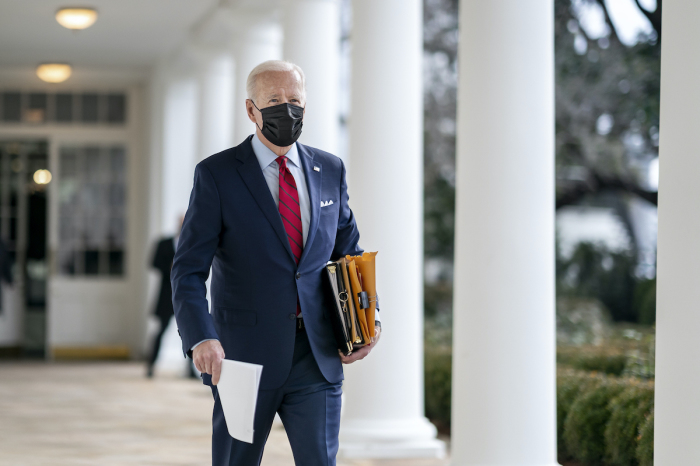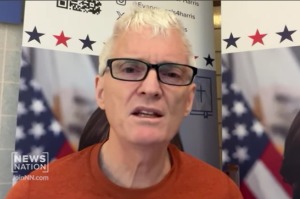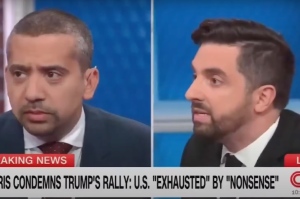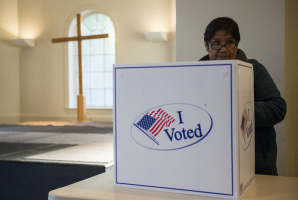63% of Biden voters reject that God is 'all powerful,' 'perfect and just' creator: survey

A new post-election survey reveals that a majority of those who voted for President Joe Biden don't believe "God is the all-powerful, all-knowing, perfect and just creator" who rules over everything in Heaven and Earth today.
The Cultural Research Center at Arizona Christian University released the fourth in-depth report about its 2020 Post-Election Survey last week. The survey was conducted between Nov. 4 and 16, 2020. The latest installment of the survey focuses on the views of Biden's voters as compared to the views of Americans who voted for former President Donald Trump as well as voters and adults as a whole.
More votes were counted in the 2020 presidential election than any other in U.S. history. Former Vice President Joe Biden got over 81 million votes, the most votes for any presidential candidate, to President Trump’s 74 million, the second-most votes in an election. Their totals also broke the record of votes cast for former President Barack Obama, who received 69.5 million votes in 2008.
Biden voters make up a plurality of those surveyed by the Cultural Research Center, accounting for 426 of the 1,000 respondents. Measured at 387, Trump voters were slightly less represented in the sample.
While 65% of Biden voters describe themselves as Christian, most (56%) said they see themselves as "spiritual but not religious" and 57% said they were not "deeply committed to practicing" their religion. Additionally, most of the Biden voters held views that were at odds with the teachings of Christianity.
For example, 68% of Biden voters believe that "The Holy Spirit is not a living entity but is a symbol of God's presence, power, or purity."
Sixty-three percent of Biden voters rejected the notion that "God is the all-powerful, all-knowing, perfect and just creator of the universe who rules that universe today" and 72% said that they believe that "a person who is generally good, or does enough good things for others, will earn a place in Heaven."
Only 30% agreed that the Bible "is the actual or inspired Word of God and contains no errors."
Seventy-five percent of Biden's voters cite something other than the Bible as their most trusted source of moral guidance. Most Biden voters who fit into this category identified their feelings, experiences, friends and family as their sources of moral guidance.
Biden voters were more likely than adults in general to believe that "having faith matters more than which faith you have," with 79% of Biden voters and 74% of all adults agreeing with that statement. Biden voters were less likely to identify as Christian than adults as a whole and Trump voters.
Seventy-five percent of Biden voters believed that "identifying moral truth is up to each individual; there are no moral absolutes that apply to everyone, all the time." Among all adults, 67% said the same.
When asked if they believe that "all religious faiths are of equal value," 68% of Biden voters answered in the affirmative compared to 62% of all adults and 56% of Trump voters. On social issues, Biden voters held divergent views from the adult population as a whole as well as their Trump-voting counterparts.
Regarding the issue of abortion, a supermajority (60%) of Biden voters believe that the Bible is ambiguous on the matter, along with a narrow majority of adults as a whole (51%) and a minority of Trump voters (41%).
Forty-two percent of Biden voters agree that "the marriage of one man to one woman is God's only acceptable plan for humanity, for all cultures on earth" while majorities of all adults (54%) and Trump voters (69%) believe that God's plan for humanity requires the upholding of traditional marriage and the nuclear family.
The idea that only those who have confessed their sins and accepted Jesus Christ as their Savior will go to Heaven when they die has 15% support among Biden voters, compared to 24% of all adults and 34% of Trump voters.
Thirty-seven percent of Biden voters see God as "the all-powerful, all-knowing, perfect and just creator of the universe who rules that universe today" while 47% of all adults and 60% of Trump voters hold the same view of God.
It also found that 31% of Biden voters are active in a Christian church compared to 42% of Trump voters.
The share of those who identify as theologically conservative stands at 25% among Biden voters and 42% among Trump voters. One-quarter (25%) of Biden's voters accept the teaching that "absolute moral truths exist and are defined in the Bible," as opposed to 43% of Trump voters.
The report also included data about the religious demographics of the supporters of the two major presidential candidates.
A plurality of Biden's voters (29%) "don't believe in God/care about God/think God's existence is knowable" while 27% attend a Protestant church, 21% attend a Catholic church, 13% "attend a Christian church, type undetermined" and 9% are non-Christians.
Meanwhile, those who attend a Protestant church constitute 42% of Trump's supporters, while Catholics made up 21%, and those who "attend a Christian church, type undetermined" were 13%, non-Christians were 7%, and those who "don't believe in God/care about God/think God's existence is knowable" comprised the rest of his voters at 18%.
Overall, Protestant voters surveyed favored Trump over Biden by a 14-point margin (47% to 33%), while the so-called "Don'ts" faith segment preferred Biden to Trump 45% to 25%.
George Barna, the director of the Arizona Christian University's Cultural Research Center who conducted the study, warned: "If our government denies the core principles on which it was founded — which were originally derived from the Bible — in favor of an inconsistent patchwork of modern philosophical preferences, the result will be chaos, constant disputes, and widespread dissatisfaction."
According to Barna, "A strong and thriving society requires a stable foundation of truth on which to make just and appropriate decisions. The more the United States puts distance between itself and its moral and spiritual moorings, the less likely we are to have an effective vibrant government and a healthy and vibrant way of life."




























